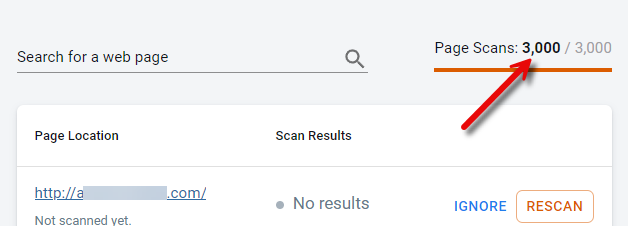AutoScan
Auto-discover trackable elements on your site: affiliate links, forms, checkout buttons. AutoScan crawls your website, identifies conversion points, and tags them with click IDs. Troubleshoot scanner errors and configure element selectors for precise tracking.
AutoScan crawls your website as soon as the AnyTrack Tracking Tag is detected. It scans pages, identifies trackable elements (affiliate links, forms, checkout buttons), and uses AutoTag to automatically append the correct click_id and SubID parameters—so you capture all conversion data.
How It Works
After you install the AnyTrack Tracking Tag, AutoScan crawls your website following your sitemap. For every page visited, AutoScan identifies links matching platforms in the Integration Catalog and tags them with the --CLICK-ID-- token. This token is replaced at runtime with the actual Click ID for the visitor triggering the conversion.
All discovered links are tracked automatically through the AnyTrack Tracking Tag once the scan completes.
Manual Page Scans
If some pages aren't discovered automatically:
- Go to Property Settings > Auto Scan
- Enter the page URL
- If the page wasn't scanned before, click Scan Page
- If the page was already scanned, view the results or click Rescan
Page Scan Limits
The Page Scans indicator shows remaining scans for the current billing period. Scans reset monthly. Upgrade your plan if you need more scans due to frequent affiliate link updates.

When No Elements Are Found
If AutoScan returns zero trackable elements, the links are likely not standard HTML anchor tags. Links generated dynamically by JavaScript after page load are invisible to the AnyTrack Tracking Tag and cannot be detected by AutoScan.
Ensure your affiliate links and trackable elements are rendered as standard <a href="..."> tags in the page source—not injected by client-side JavaScript after page loads.
Shopify and WooCommerce Integration
If your site runs on Shopify or WooCommerce, ignore AutoScan results and errors. All trackable elements on these platforms are already mapped through their dedicated integrations—AutoScan is not required.
Blocked Crawlers
If you've installed security software (Cloudflare, Sucuri, etc.), allowlist the AnyTrack crawler. Use the crawler name (not IP address—AnyTrack uses dynamic IPs).
Crawler name: AnyTrack-Crawler/1.0
A blocked crawler does not indicate a missing AnyTrack Tracking Tag. It only prevents AutoScan from crawling pages. The Tracking Tag still fires normally for real visitors.
Selector Configuration
When editing a tracked element, you'll see Selector IDs under the element name. Change selectors to target different elements on the page.
Element selectors have property-wide scope—changing a selector on one page applies to all pages with that same selector. Switch to a more specific selector to narrow the match.
Selector Types
Link Selector — Matches full or partial URLs:
trafficker.io/recommends/cj-affiliate-link/trafficker.io/recommends/cj-affiliate-link/?utm_source=trafficker
Element ID Selector — Matches HTML elements by tag type and ID:
button#add-to-cartmatches an "Add to Cart" button
Element Label Selector — Matches HTML elements by tag type and displayed text:
a:"Buy Now"matches a link displaying "Buy Now"
A link selector can be followed by an element label selector to match elements only on specific page URLs.
Frequently Asked Questions
FAQ was last reviewed on 2026-02-21
Updated 21 minutes ago
